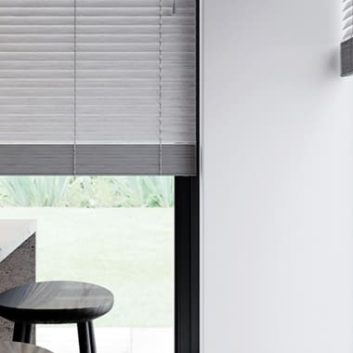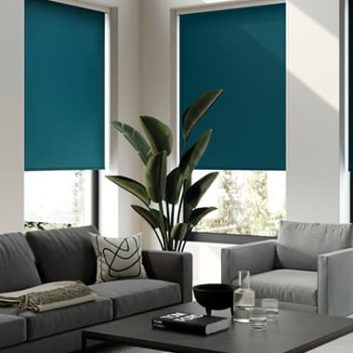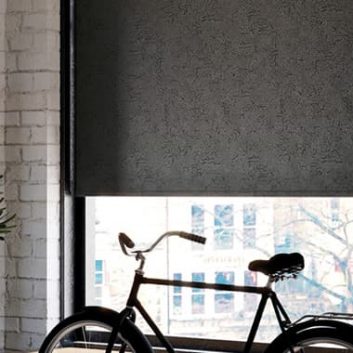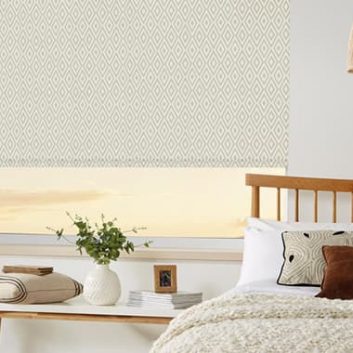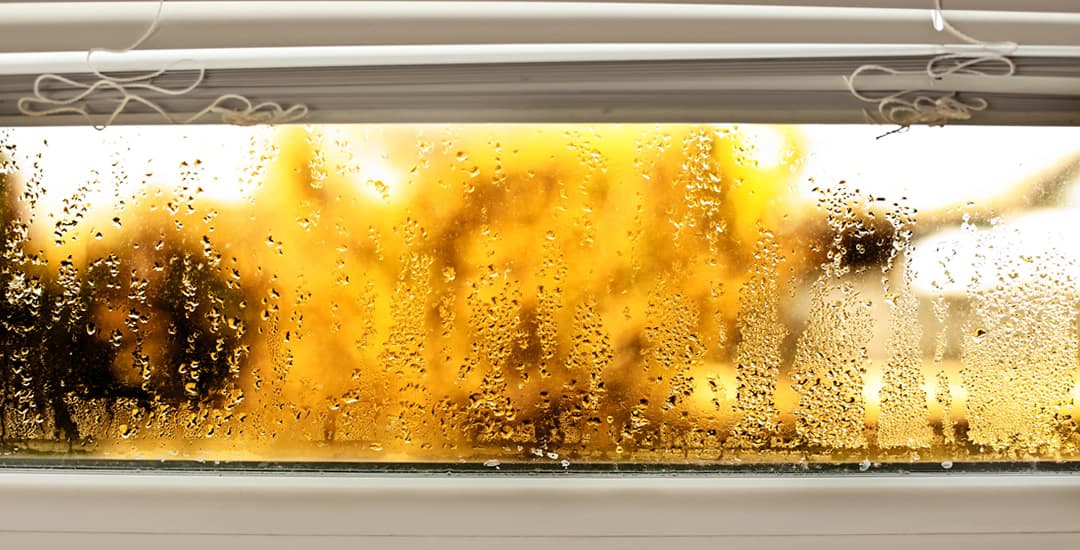
Which blinds will stop condensation? Sadly, none of them, as this is not how condensation works. In fact, if you leave a blind permanently closed over a window that is already condensated, it can stop the condensation from dissipating, as it reduces air circulation and means that the window never really gets a chance to dry.
While I can’t tell you which blinds will stop condensation from developing (because there aren’t any), I can tell you the types of blinds that will help to reduce the build-up of condensation, or cut down on how long condensation hangs around when the factors that triggered it have gone.
Essentially, these are blinds that allow air to circulate between the blind and the window efficiently.
In this blog post I will also share some tips on how to fit blinds to reduce condensation build-up, and outline what type of blinds are most likely to contribute to condensation hanging around as well.
If “which blinds will stop condensation” isn’t a thing, how does condensation form?
If you got here hoping to find out which window blinds will stop condensation, I’m guessing that you’re not totally clear on why or how condensation actually develops.
For condensation to develop on your window, there needs to be some moisture in the air (which is the case in every home, albeit it is far more acute in some homes than others) and for there to be a marked difference in the heat on the outside of the window compared to the heat inside, with the hotter side being the side inside of the house.
In fact, I used to have student digs so cold and grim that I used to say that in my flat, the windows condensated on the outside, not the inside, and I was not entirely joking…
Anyway. Moisture in the air and a heat disparity acute enough can cause moisture to collect on the inside of the window’s glass, to the point that it then forms those drops and even potentially rivulets of water that we call condensation.
Theoretically, you are far less likely to get condensation on double glazed windows compared to single-glazed windows, as the air between the two pieces of glass helps to insulate and partially mitigate the temperature disparity.
On the flipside though, if your home is very well insulated including having double glazed windows, it might actually be more prone to condensation, as the sort of added ventilation you get in homes with some gaps and drafts helps to create airflow that dissipates moisture in the air and prevents or reduces condensation formation.
I hope that all makes sense? I quickly ruled out a career as a science teacher, but I’m doing the best I can here…
Which blinds will stop condensation from becoming acute?
Blinds can’t stop condensation from developing; if your window was going to condensate in a certain situation (or condensated regularly even before you got your blinds) blinds are not going to stop this.
But the type of blinds you pick can help to ensure that condensation that does develop dissipates as quickly as possible, or more to the point, that your blind doesn’t stop any unavoidable condensation from escaping when it’s good and ready to move on.
Any blind that is fully open will avoid trapping condensation; but few of us buy blinds just to never use them, and so the blinds that will help you to reduce condensation build-up are those that you can close or partially close while still maintaining some airflow to the window behind them.
This means that your top choices are Venetian blinds, faux-wood, and real wood blinds, and also vertical blinds, all of which have tiltable or rotatable slats or louvres. These enable you to maintain airflow, while still controlling the level of privacy and the amount of sun filtering through that you get.
Which blinds will stop condensation from being able to dissipate effectively?
Knowing which blinds will stop condensation from being able to dissipate effectively and that will instead potentially contribute to any problems is important if you have the type of windows that start streaming with water without any real provocation at all.
There are some types of blinds that when closed, can make condensation seem worse, as it traps the water without allowing for the airflow it needs to dissipate. These are blinds made of a solid piece of fabric and left in the closed position; basically, roller blinds and Roman blinds.
This doesn’t mean you cannot have roller blinds or Roman blinds on a window that tends to condensate badly, as long as you have the blind open (all the way, ideally) during the day to allow the window to get the airflow that will enable the condensation to dissipate.
But if you tend to leave your blinds closed during the day, roller or Roman blinds will be a poor choice on a window that condensates.
How to fit blinds to reduce condensation build-up
You can help to reduce condensation to an extent by means of how you fit your blinds too; the closer they are to the glass of the window, the less airflow they will allow for and so, the worse the condensation is apt to be.
This means that hanging your blinds outside of/over the window recess is a better approach for windows that condensate; and if you do hang your blinds inside of the recess, the further you can get them from the glass, the better.
Blinds to avoid for windows that condensate
If you do have windows that condensate badly, and particularly if your blinds are hung fairly close to the window (such as inside of the recess) there is a chance that your blind is going to come into regular and/or protracted contact with water. This will probably be either by means of touching the wet window itself, or just by virtue of the amount of moisture in the air that is present immediately next to condensated glass.
If this seems like it might be the case for your windows, you should seriously consider getting waterproof blinds, and avoiding those made of non-waterproof materials.
Fabric blinds that aren’t waterproof but that are in close proximity to or direct contact with water a lot are apt to develop mould and mildew. Even real wooden blinds may suffer over the long term from being used in a very moist or damp environment, such as nestled against a heavily condensated window, so factor this in too.

